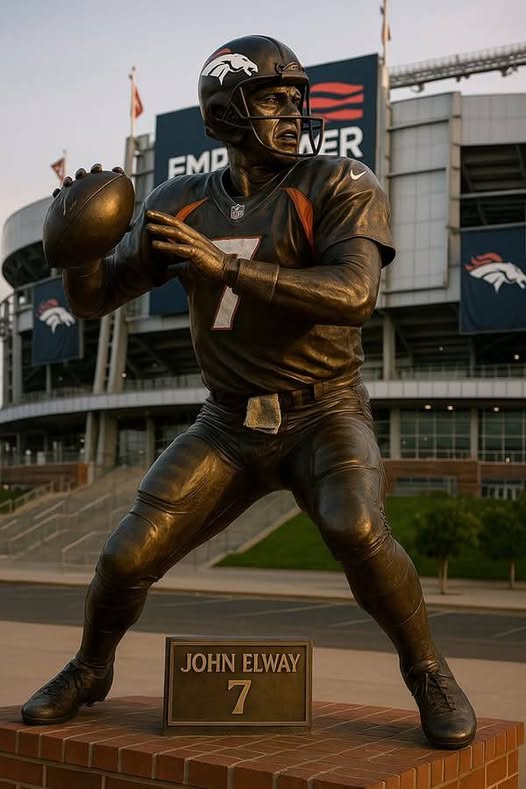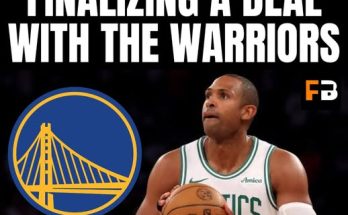In a moment that will be forever etched in the hearts of Denver Broncos fans and NFL enthusiasts alike, the franchise unveiled a stunning bronze statue of legendary quarterback John Elway outside Empower Field at Mile High. The statue, which now stands tall and proud, captures not only the physical presence of Elway but also the spirit and enduring legacy of a man who defined an era of Broncos football and changed the trajectory of the franchise forever.
For generations of Broncos fans, Elway is more than just a football player. He is an icon, a leader, and a symbol of perseverance, excellence, and loyalty. The unveiling ceremony drew thousands of passionate supporters, former teammates, coaches, executives, and members of Elway’s family. Each person in attendance shared a deep reverence for what Elway meant to the game, the team, and the city of Denver.
Crafted with intricate detail and standing nearly eight feet tall atop a granite pedestal, the bronze sculpture portrays Elway in his signature throwing motion—frozen in time just as he launches a tight spiral downfield. Every detail, from the determined expression on his face to the creases in his uniform, was carefully designed to reflect the tenacity and grace with which Elway played the game. Sculptor Brian Hanlon, renowned for his ability to bring sports legends to life in sculpture, was commissioned to create the piece, and he called it “one of the most meaningful projects of my career.”
Elway’s journey to immortality is the stuff of legend. Drafted first overall in the 1983 NFL Draft, Elway initially refused to play for the Baltimore Colts, and a tense standoff ensued. Eventually, the Denver Broncos acquired him in a trade that would forever change the franchise’s history. From that day on, Elway became the face of the Broncos, a relentless competitor who led with heart and determination.
Over the course of his 16-year playing career, Elway threw for over 51,000 yards, 300 touchdowns, and was selected to nine Pro Bowls. He led the Broncos to five Super Bowl appearances, winning two in back-to-back seasons to close out his illustrious career. His final game, a Super Bowl XXXIII victory over the Atlanta Falcons, ended with him being named the game’s MVP—a fitting curtain call for one of the NFL’s greatest quarterbacks.
The statue unveiling serves as a permanent reminder of those historic moments and the legacy Elway carved into the very fabric of the NFL. While his statistics and accolades tell part of the story, what made Elway truly special was his uncanny ability to rally his team in the clutch, his never-say-die attitude, and his deep connection to the city and its fans. The term “The Drive” still brings chills to fans who remember his epic 98-yard game-tying march in the 1986 AFC Championship Game against the Cleveland Browns—a moment that remains one of the greatest feats in NFL history.
The dedication ceremony was emotional. Elway, now 65, stood beside his likeness with tears in his eyes, clearly moved by the magnitude of the tribute. “This is unbelievable,” he said, pausing to gather his emotions. “To be immortalized like this, outside the stadium where so many memories were made, it’s humbling. I’ve always said football is the ultimate team game, and this statue is as much for my teammates, coaches, and the fans as it is for me. We did this together.”
As he spoke, the crowd responded with thunderous applause, many donning his iconic No. 7 jersey, a symbol that has become synonymous with hope, resilience, and greatness in Colorado. Team owner Greg Penner called Elway “the embodiment of what it means to be a Denver Bronco,” noting that the statue was a small way to say thank you to a man whose contributions stretched well beyond the gridiron.
Indeed, Elway’s impact on the franchise didn’t end with his retirement as a player. He returned to the Broncos as an executive and served as the team’s general manager and president of football operations from 2011 to 2020. Under his leadership, the Broncos reached two more Super Bowls and captured their third Lombardi Trophy in Super Bowl 50 behind a dominant defense and veteran quarterback Peyton Manning. It was a poetic moment—Elway, the player who had given his all to win as a quarterback, now the architect of another championship team.
Even off the field, Elway has continued to influence Denver through his philanthropic efforts and business ventures. He has been an active supporter of children’s charities, cancer research, and community development projects across Colorado. His generosity and commitment to giving back further



